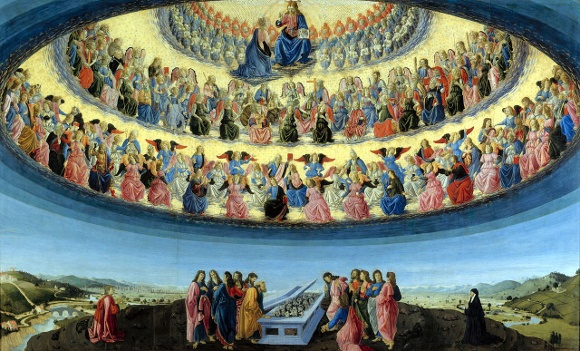Othello Contents
- Religious/ philosophical context
- Theatrical context
The nature of humanity
According to Christian belief, all human beings are creatures – that is, they are created. Shakespeare's audience believed that everything and everybody was created by God, the all-powerful and loving father of the universe.
An ordered created world
 At the time Shakespeare was writing, the universe was seen as a hierarchy, known as the Chain of Being:
At the time Shakespeare was writing, the universe was seen as a hierarchy, known as the Chain of Being:- God, the Creator, was at the top
- Next to God in the order of creation were the angelic spirits: there were thought to be nine orders, or ranks: Seraphs, Cherubs, Thrones, Principalities, Virtues, Powers, Dominions, Archangels, Angels
- As spirits, these were unchangeable, bodiless intermediaries between God and man; although they did not have bodies, they were thought to be able to create themselves bodies out of air so that they could appear to humans
- Below these spirits were human beings, who were thought to be unique in having both a body, like animals, but also a spirit (or soul)
- Below mankind came animals, having body but no soul
- Finally were plants; then stones.
The state as a body
Parallel orders
Just as God is at the top of the hierarchy in the Universe
- So are kings and other rulers the highest within the state
- So is the head, the seat of reason, within the person.
Shakespeare often compares the state, or body politic, to the human body:
- For example, just as the physical body may be subject to disease, so the state may be riddled with corruption
- In many of his plays, Shakespeare uses images of disease metaphors for the corruption seen in Elizabethan society.
Reason versus passion
Shakespeare frequently stresses that it is reason which informs the soul of man and makes humans higher than animals:
- Because people have a soul, they can aspire to reach beyond their body and mortality
- If they debase their soul and lose their reason – especially through drunkenness or by giving way to extreme passion – then they are no better than animals.
Sexual activity
Part of human nature is sexual activity. Shakespeare shows that, here too, it is important to get the balance right:
- Characters for whom sex is merely sensual, involving no commitment, are rarely respected
- For Shakespeare's audience, marriage under the previous Roman Catholic regime had been regarded as a sacrament – a special sign of spiritual grace
- Even though Protestants did not accept marriage as a sacrament, it was nevertheless an important ceremony involving vows made in the presence of God
- Although there was inevitably sexual activity outside marriage, it was very much frowned upon and the woman would usually be considered disgraced. Shakespeare himself got Ann Hathaway pregnant and had to marry her hastily before the child arrived, so he would be well aware of this. (See Author section: 1564 - 1592: Stratford Beginnings.)
Name originally given to disciples of Jesus by outsiders and gradually adopted by the Early Church.
The Bible describes God as the unique supreme being, creator and ruler of the universe.
Member of a worldwide Christian church which traces its origins from St. Peter, one of Jesus' original disciples. It has a continuous history from earliest Christianity.
Religious ceremony which symbolises receiving an inward spiritual grace.
Christians whose faith and practice stems from the Reformation movement in the sixteenth century which resulted in new churches being created as an alternative to the Roman Catholic Church.
